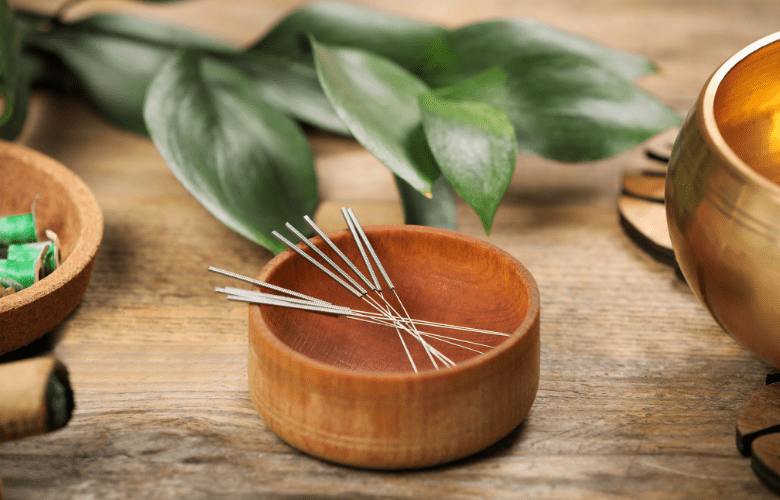6 Big Reasons to Try Acupuncture for Hypothyroidism
From dawn till dusk, your thyroid works tirelessly behind the scenes. It pumps out two crucial hormones: T4 and T3. These hormones help regulate everything from heart rate and body temperature to digestion and muscle control. But what happens when your thyroid doesn’t make enough of these hormones — a condition called hypothyroidism? Your entire system turns out of whack! Enter acupuncture. According to the WHO, acupuncture can help treat thyroid diseases. In this article, discover 6 reasons why you should try acupuncture for hypothyroidism.
UNDERSTANDING HYPOTHYROIDISM IN TCM
According to Traditional Chinese Medicine (TCM), hypothyroidism is an imbalance in the body’s vital energies. It’s a systemic disorder rooted in deficiencies of Qi (“chee”), Blood, Yang, Yin, and Essence.
Imagine hypothyroidism like a domino effect. It all starts with a general Qi deficiency. Over time, it affects multiple organ systems, with the Spleen, Kidneys, and Heart taking center stage in the dysfunction.
Hypothyroidism can manifest in three main patterns:
1. Spleen Qi Deficiency
This is like the early stage of hypothyroidism, where the body’s energy, or Qi, is running on empty. Symptoms include lethargy, fatigue, shortness of breath, reduced appetite, and weak pulse. Your body is sputtering, struggling to keep up with the demands of daily life.
2. Spleen Yang Deficiency
As hypothyroidism progresses, the Yang energy of the Spleen weakens. This can lead to intolerance to cold, poor appetite, fatigue (especially in the cold), and abdominal discomfort. It’s like your body’s internal thermostat is malfunctioning, leaving you feeling chilled to the bone and sluggish.
3. Qi and Blood Deficiency
This pattern is marked by a depletion of both Qi and Blood. You can experience symptoms like fatigue, weakness, palpitations, sallow complexion, and irregular menstruation. Your body’s energy reserves have hit rock bottom, affecting everything from your vitality to your menstrual cycle.
In essence, hypothyroidism in TCM isn’t just about a wonky thyroid gland. It’s a complex interplay of energies and organs, each one affecting the other. Eventually, the consequences can be dire: cardiac dysfunction, fluid imbalances, and a host of life-threatening complications.
But there’s hope! With the right approach and timely intervention, you can rebalance your body’s energies and feel like your best self again. This highlights the interconnectedness of symptoms and the need for a holistic approach to treatment in TCM.
WHY ACUPUNCTURE FOR HYPOTHYROIDISM? HERE ARE 6 REASONS:
Acupuncture offers holistic solutions that go beyond conventional treatments. Today, let’s uncover the top six reasons why it might just be the missing piece in your hypothyroidism puzzle.
1. Regulation of thyroid function
With its tiny needles, acupuncture taps into your body’s energy pathways, helping to restore balance where it’s needed most. Targeting specific points gives your thyroid gland a gentle nudge, encouraging it to kick into gear and start producing those essential hormones.
The choice of acupoints to target during treatment depends on the specific diagnosis made by a TCM practitioner. In many cases, focusing on points along the kidney channel proves beneficial. Why? Well, the kidney channel in TCM is closely linked to hormone regulation and thyroid function.
2. Improved blood circulation
Acupuncture stimulates the release of vasodilators, substances that widen blood vessels. This widening increases blood flow to various tissues, including the thyroid gland, potentially improving oxygen and nutrient delivery.
Moreover, the tiny needles activate sensory nerves, triggering a cascade of signals that influence blood vessel dilation and constriction. By modulating neural pathways, acupuncture can help regulate blood flow to the thyroid gland and surrounding tissues.
3. Stress Reduction
Stress can exacerbate hypothyroid symptoms and disrupt hormonal balance. Acupuncture sessions often induce a state of relaxation by releasing endorphins, the body’s natural painkillers. This can help alleviate stress-related factors contributing to hypothyroidism.
Also, acupuncture has been shown to modulate the hypothalamic-pituitary-adrenal (HPA) axis, the body’s primary stress response system. By regulating the release of stress hormones such as cortisol, acupuncture helps to restore balance to the body’s stress response, reducing overall stress levels.
4. Immune Modulation
Acupuncture has been shown to regulate the production and activity of inflammatory mediators in the body. This can be particularly beneficial in autoimmune thyroid disorders like Hashimoto’s thyroiditis, where chronic inflammation contributes to thyroid dysfunction.
But that’s not all—acupuncture also plays a role in the immune system’s frontline defense, the T-cells. With acupuncture’s help, particularly by boosting the activity of regulatory T-cells (Tregs), the body can better maintain immune balance and fend off autoimmune attacks on the thyroid.
5. Hormonal Balance
A 2020 study suggested that acupuncture could impact TSH levels, regulating the thyroid gland’s hormone production. This modulation may normalize TSH levels by influencing the feedback loop among the hypothalamus, pituitary gland, and thyroid gland, potentially improving thyroid hormone regulation.
Acupuncture also influences the release and activity of neurotransmitters such as serotonin, dopamine, and gamma-aminobutyric acid (GABA). By balancing neurotransmitter levels, acupuncture helps to promote hormonal equilibrium and may alleviate symptoms of hormone imbalance associated with hypothyroidism.
6. Individualized Treatment
A recent study published in the National Journal of Physiology and Pharmacology found that targeting specific acupoints is effective in treating hypothyroidism. Acupuncture treatments can help rebalance the body’s energy systems and support thyroid function effectively.
Acupuncturists tailor treatments to address symptoms like fatigue, weight gain, and mood changes. This allows for flexibility in adjusting treatment strategies over time to optimize outcomes and address any changes in symptoms or health status.
CAN CHINESE HERBS HELP WITH HYPOTHYROIDISM?
In addition to acupuncture needling, treatment for hypothyroidism may incorporate herbal therapies to promote holistic healing. Chinese herbal formulas typically include a combination of herbs that target underlying imbalances specific to each individual’s diagnosis and symptoms.
Some common Chinese herbs used for hypothyroidism include:
- Shan Yao (Chinese Yam): Shan Yao is believed to tonify the Spleen and Kidneys, which are often implicated in TCM patterns of hypothyroidism. It may help improve digestion, energy levels, and overall vitality.
- Huang Qi (Astragalus Root): This herb is known for its immune-boosting and adaptogenic properties. It may help strengthen the body’s resistance to stress and support thyroid function.
- Bai Zhu (White Atractylodes Rhizome): Bai Zhu is commonly used to tonify the Spleen and promote digestion. It may help alleviate fatigue, improve appetite, and enhance energy levels in individuals with hypothyroidism.
- Dang Shen (Codonopsis Root): Dang Shen is a gentle tonic herb. It may help boost energy, strengthen the immune system, and promote overall well-being in individuals with hypothyroidism.
- Gui Zhi (Cinnamon Twig): Often included in herbal formulas, Gui Zhi helps promote circulation and warmth in the body. It may help alleviate symptoms of cold intolerance and improve circulation to the thyroid gland.
Unlike Western medicine, TCM recognizes the importance of individualized treatment. Herbal formulas are carefully tailored to address each person’s specific pattern of disharmony. Therefore, consulting a qualified practitioner is essential to ensure accurate diagnosis and personalized treatment.
THE BOTTOM LINE
Acupuncture for hypothyroidism offers a holistic and personalized approach to managing this complex condition. With its gentle yet potent effects, acupuncture not only targets the thyroid gland directly but also addresses underlying imbalances contributing to the disorder. Plus, throw in some Chinese herbs, and you’ve got yourself a winning combo. Book a consultation with a TCM practitioner today and let’s get your thyroid back on track!












